Philip Chauncy’s memoir: 1839 part 3: Leaving England
Final preparations for emigration and departure
This post is the final part of a three-part series transcribing the manuscript memoirs of my third great grandfather Philip Lamothe Snell Chauncy (1816 – 1880). He was writing in 1877, recalling events of the year 1839.
Philip had decided to emigrate to South Australia. He describes his preparations for the voyage and his new life in the colony, and recalls sightseeing in London and visiting friends and relations.
Philip emigrated in June 1839 and never returned to England. He appears to have had no misgivings. Forty years later he wrote:
I left England without much, if any, regret, and did not consider that I might never see it again. I was delighted to be free, to be as I thought my own master and among entire strangers. The romance too of crossing the great ocean and of being months at sea in different parts of the world had Great charms for me. I was going too to a new country of which but little was yet known, and yet not to be among strangers but to my own dear beloved sisters. I was always fond of natural history and the prospect of seeing so much that would be new to me gave me unbounded pleasure. I thought but little of the past my mind was set on the future.
I was saying that I yielded to the advice of my brother William in taking out a variety of merchandise for sale and a complete equipment for myself, including, singlesticks, boxing gloves & two enormous cork bungs wherewith to learn to swim – I kept these bungs for many years without ever using them, they were useless for the purpose intended & I cd never find anyone to accept them and thought they were too good to throw away. I shd probably have done much better to have kept my money together to invest in land. I bought some silver plate, a good watch, theodolite and other surveying instruments but one 80-acre land order from the South Australian Commissioners.
I took a cabin with a T. Perry a single gentleman for which we each paid £70 in the good bark Dumfries. I saw the Queen and her uncle the Duke of Sussex & left a Power of Attorney with Western on the 20th. I went from London down to Barkway on a long promised visit to Wm Noel Jackson at his father’s, Mr Anthony Jackson and spent a [?? not clear] time their beautiful place, we went out shooting visiting and driving and in the Evening had music and cards. There were two young ladies very tall, the sisters of William, another sister had been married twelve months before to Mr Robert Gouger the first Colonial Secretary of South Aust and she was the first European to die and be buried in Adelaide. She was interred with her infant in the garden in front of Mr. Gouger’s house in Flinders street.
I spent some time learning to adjust my new theodolite, for Mr. Joseph Jackson never used any instrument for taking angles and therefore had never given me any instruction in this fundamental part of a surveyor’s Education.
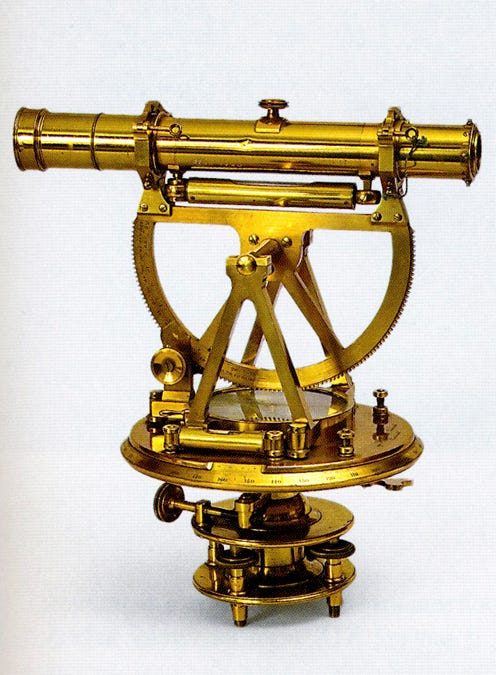
On the 6th of June I returned to London and on the 7th Curtis [Philip’s step-uncle] introduced me to the Lord Mayor & to his wife and sister.
On the 9th my father and I visited Mr John Snell at Edmonton, he was my father’s step uncle & a very rich old bachelor. We staid there all night and the next day Mr. Snell accompanied us to the city when he shewed me several of the ancient places and buildings worthy of note for he was a very learned antiquary. He also took me to the sugar Exchange (Franklyn and sons) in Mincing Lane where he was in the habit of sitting as chairman for he was a large proprietor of Estates in the West Indies.
On the 12th Mr Snell and I walked about again and called at Nathaniel Snell’sTown house in Gloster Place.
On the 13th I arranged to take out as my servant a man named Lowanburgh and his wife and daughter, William had known them at Ascot, I did not want them but this was a cheap way for them to Emigrate under the Commissn’s regulations.
On the 14th I went with an acquaintance named Cheyne over the Armouries in the Tower of London. I then with my Father and Sophia dined in the City and we all with William and Eunice went on board the Dumfries in St. Catherine dock, and we drank a bottle of wine together.
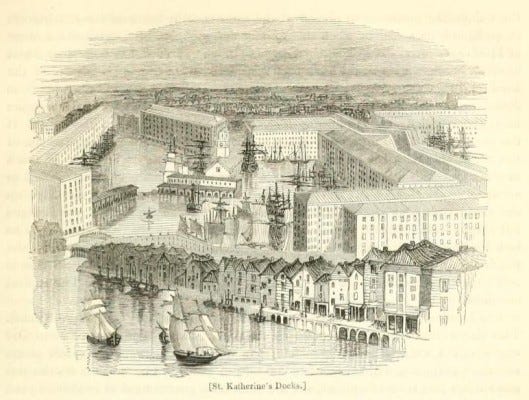
On the 15th after visiting the Zoological gardens with Cheyne I dressed and went out to dinner at Mr. Snell’s at Edmonton & slept there. The next day being Sunday Mr Snell and I went to Tottenham Church and then called on Mr Holbrook a wealthy friend of his who showed us his magnificent stud of thoroughbred brood mares. In the afternoon my cousin Nat. Chauncy and his friend Crawford Davidson came and dined and in the evening we drove back to London in his Tilbury to this house at the West End.
On the 17th and 18th I was packing and getting my goods on board. On the 19th Father and Sophia called on me and in the evening I returned home with them to Clapham.
On the 20 June Wm & I went to Gravesend and on board the Dumfries where I slept and had a bad bilious attack and went ashore again the next day – the 23rd anniversary of my birthday. My Father, Sophia and William and I dined together at the Falcon Inn at Gravesend after which they all went on board with me and bid me a long farewell.
The same afternoon Mr. and Mrs Henry Kemmis and family of two Children Henry and Emily and I think a Baby came on board. At 5.45 pm. next day we set sail and drifted 30 miles down the Thames to the Nore where we anchored.
And so I left my native country in the heyday of youth! I was sorry to leave my Father but as I knew be intended to follow me shortly my grief at leaving him was not very durable. The same, in a lesser degree may be said regarding my brothers William and Hugh and sisters Eunice and Sophia, all of whom except Eunice, now Mrs Grey Anderson a widow residing in Douglas in the Isle of Man, shortly afterwards came out to South Australia.
My Father had always been in the habit of changing his residence every few year but latterly when he had only Eunice and Sophie at home he changed his place of abode every few months. I had been absent from home for six years – one at Margate and five at Mr. Jackson’s, William had been with Mr Higgins in London and Hugh at March. It was not therefore surprising that I left England without much, if any, regret, and did not consider that I might never see it again. I was delighted to be free, to be as I thought my own master and among entire strangers. The romance too of crossing the great ocean and of being months at sea in different parts of the world had Great charms for me. I was going too to a new country of which but little was yet known, and yet not to be among strangers but to my own dear beloved sisters. I was always fond of natural history and the prospect of seeing so much that would be new to me gave me unbounded pleasure. I thought but little of the past my mind was set on the future. Yet I did not forget my gracious and merciful Heavenly Father – I believe I never omitted prayers morning and evening as well as occasional prayer and I read portions of the sacred scriptures in the Evening.
On the 23d June we left the Nore and anchored off the North Foreland where I wrote to my Father and amused myself with fishing.
On the 25th June we sailed into the Downs where we lay till the most morning when seven of us cabin passengers went on shore a mile below Deal to which town we walked and after making a few purchases returned on board taking a cat with us.
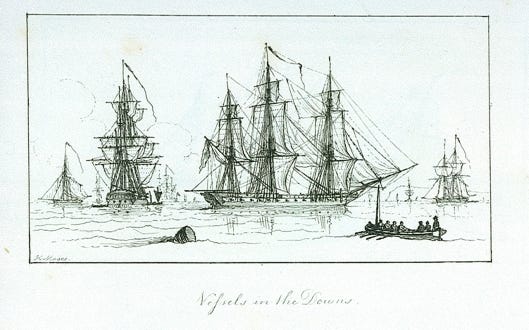
At this time I began to keep a sea journal in a proper log book which I bought for the purpose. I also commenced reading the two Vols. of Major Mitchell‘s Explorations in Eastern Austa in the years 1835-6 and which had been recently published.
The ship “Dumfries” was built at Greenwich and was now on her second or third voyage. She was registered at 468 tons and was commanded by Captain Richard Thomson.
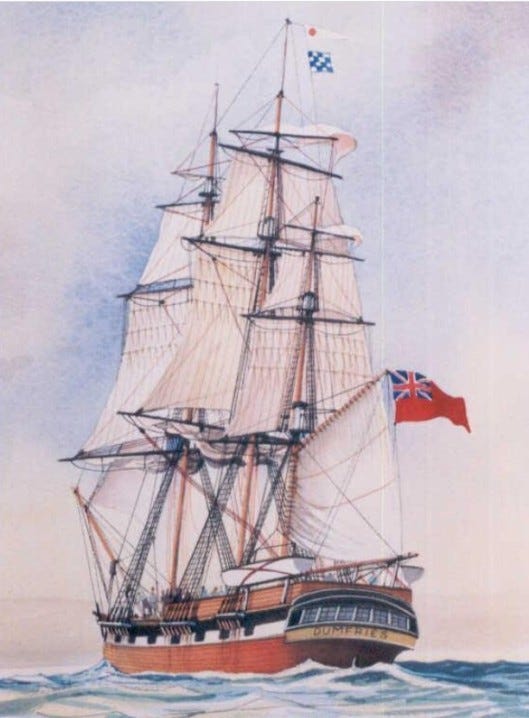
There were sixteen cabin passengers including Mr. Kemmis’s 3 children, 29 adults and 15 children in the Intermediate, and 23 in the steerage, and the ship’s company consisted of 22, making in all 105 persons.
Philip Chauncy goes on to describe the passengers and the voyage..
The wind had been blowing a gale from the west. It finally moderated and veered to the east and at 3pm on 26 June they sailed from the Downs, tacking between Beachey Head and the coast of France. The “Dumfries” finally cleared the Channel on 1 July. During the stormy weather most of the passengers, including Philip, were seasick.
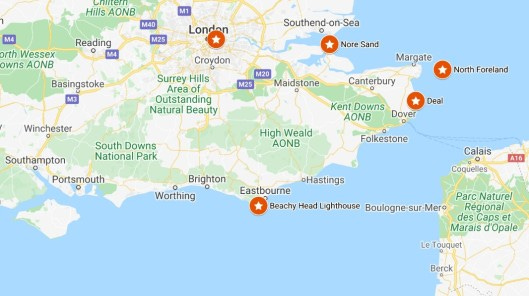
The “Dumfries” arrived in Port Adelaide on Sunday October 11, 3 months 10 days after clearing the Channel on 1 July and 3 months 19 days after leaving London.
There appears to be an earlier draft of the memoir he prepared in 1877. The Chauncy papers also include an extract of a journal he kept on his voyage out.
Philip’s 1877 memoir does not continue beyond 1839 and does not describe his life in Australia. He touches on this in part, however, in Memoirs of Mrs. Poole and Mrs. Chauncy which he published in 1873.
I have found it very interesting to read Philip Chauncy’s account of his life and his opinions. I am grateful that the manuscript has been preserved and that I was able to obtain a digital copy to be able to study it in more detail.
Related posts
Philip Lamothe Snell Chauncy, son of William Snell [Brown] Chauncy and Rose Therese Lamothe was born on 21 June 1816 in Datchet, Buckinghamshire, England. He died on 9 April 1880 in Ballarat, Victoria.
1877 Memoir
E is for emigration (1839 Chauncy on Dumfries)
E is for emigration (general)
Philip first married Charlotte Humphries Kemmis (1816 – 1847) on 16 March 1841 at Trinity Church, Adelaide, South Australia. He met Charlotte on board the Dumfries.
Charlotte Kemmis (1816-1847); first wife of Philip Lamothe Snell Chauncy
Charlotte was the daughter of Thomas: Reverend Thomas Kemmis (1774 – 1827)
The voyage of Philip’s sisters Theresa and Martha: Bound for South Australia 1837


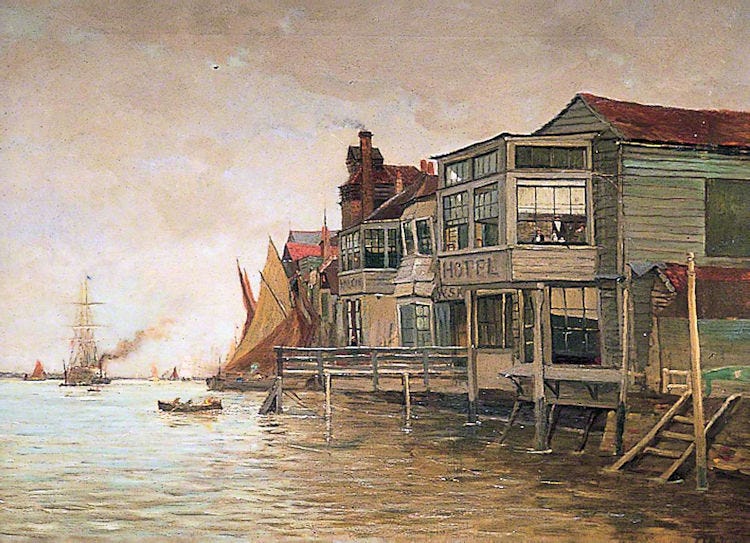
It's so great that this memoir has been treasured and kept Anne. He writes in such great detail, that I can feel his excitement building about starting a new life on the other side of the world. Is the same Chauncy ancestor that was surveyor at Heathcote? I seem to remember reading something a few years ago that you posted and was particularly interested because I used to walk past the Chauncy house every day when I worked in Heathcote.
I have my Gr Gr Grandfather's travel diary from 1874 when they traveled from the old to the new world. You've inspired me to tell that story. Great job on yours btw! Enjoyable read.